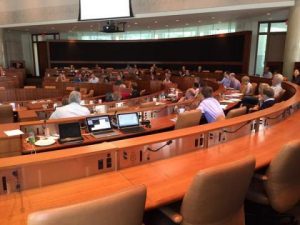Final Report: Community Meeting I – Analysis, Management and Sharing of Antigen Receptor Repertoire (AIRR) Sequence Data 29 May – 1 June 2015 Simon Fraser University, Vancouver, BC, Canada This first meeting of the AIRR Research Community brought together experts in the production and analysis of antigen receptor repertoire (or adaptive-immune receptor repertoire; AIRR) data with ethicists, data-security personnel, IP and legal experts, and representatives from funding agencies, to discuss the challenges involved with sharing and comparing this new and expanding type of data. About 70 people attended the meeting, which was organized as a series of workshops addressing topics such as data production quality control, data analysis and integration, and the legal, ethical and IP considerations in sharing AIRR sequence data.
This Community Meeting was motivated by the fact that many academic labs, biomedical research institutions, and pharmaceutical companies are applying next-generation sequencing (NGS) technology to understand adaptive-immune receptor (antibody/B-cell & T-cell repertoires) repertoires. Given NGS technology, it is now possible to sequence millions of molecules from an AIRR, as a means of describing this aspect of the immune response in great detail. These data are now critical for studies of autoimmune diseases, development of vaccines, therapeutic antibodies and cancer immunotherapies, for monitoring clinical trials, and for other developments in immunological research and patient care. However, storing and analyzing these data have become rapidly escalating challenges. The value of AIRR data will increase substantially if researchers can share and compare data among studies and institutions; but at present a common database format and common platforms do not exist for sharing these data. Beyond these bioinformatics challenges, IP, ethics and legal challenges thwart our ability to share and compare AIRR data.
The main outcome of this first Community Meeting was the consensus opinion that sharing AIRR data is essential to the development of this field, and that the community should commit to developing a common repository for AIRR data. To that end, we have formed Working Groups focused on: (1) determining a minimal set of metadata and associated data to include when publishing AIRR data or submitting them to a common database, (2) developing common biologic and bionformatic standards for validating approaches and protocols common to the AIRR Community (3) developing platforms for facilitating sharing of AIRR data, and (4) producing a white paper explaining the goals of the AIRR community. The overall goal coming out of the meeting was to continue to self-organize the community involved in producing and analyzing AIRRs. This AIRR-1 Community Meeting was supported by CIHR, NIH, GenMab, The Antibody Society, CHAVI, the IRMACS Centre, and Simon Fraser University.


